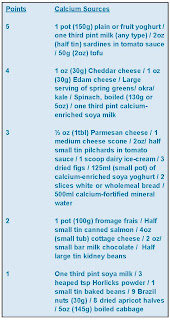Osteoporosis means 'porous bone'. Bones become thin and their strength is reduced, making them more likely to break. Thinning bone can also cause chronic bone pain in later years - particularly back pain. Bones are made of collagen fibres filled in with calcium and other minerals to create a hard structure. Bones are constantly remodelled to suit our lifestyle. During childhood and early adulthood they develop their strength and from our mid-30s onwards start to lose calcium slowly, causing bone thinning. Therefore it is very important to strengthen bones in the first 30 years of life to 'stockpile' calcium and other minerals, helping to offset the effect of ageing on bone loss, and reducing the risk of osteoporosis. A bone-friendly diet and lifestyle is useful at any age to strengthen bone, or minimise age related bone loss.
Daily weight-bearing exercise can strengthen lower bones. Walking, running, standing or just shifting weight from one foot to another while standing for a bus are examples of weight bearing
exercise. Swimming is not a weight bearing exercise.
Sedentary or bed bound people will find it difficult to strengthen bones, even if their diet is calcium rich. This is due to lack of weight bearing exercise.
Getting adequate vitamin D from diet and supplements (vitamin supplements or cod liver oil) or exposure to sunshine. Most foods are too low in vitamin D to make a sufficient contribution to health.
Consuming adequate amounts of vitamin K, found in green, leafy vegetables, to help form the bone-hardening protein called osteocalcin.
Avoid vitamin A supplements in excess of 1500mcg (5000 IU*) daily. This amount is only found in high dose supplements, and blocks the action of vitamin K on bone health.
Make sure that you have enough protein-containing foods in your diet.
Aim for meat, fish, dairy or vegetarian alternatives, Tofu or pulses twice a day.
How much calcium do I need?
An ideal calcium intake for adults is between 700mg to 1000mg a day. To assess your diet check the table below. Each 'point' is worth 50mg of calcium, so you should aim routinely to take 14 points daily. If you find it hard to make up this amount from diet alone, you should take a daily
calcium supplement providing 400-600mg of calcium, preferably one that also contains 5-10mcg (200-400 IU*) of vitamin D. Take supplements with food to help aid calcium uptake into your body.
Each 'point' = 50mg calcium.
Aim for at least 14 points daily.

How much vitamin D do I need?
Vitamin D increases calcium absorption from our foods into our body, and helps strengthen bones. The main source of vitamin D is the action of direct sunlight on exposed skin. You are at risk of vitamin D deficiency if you cover up outside, avoid the sun, or have darker coloured skin. You are also at risk of deficiency if you are housebound as it is not possible to make vitamin D through glass. Wearing sunscreen higher than Factor 8 reduces vitamin D production by 95%.
Vitamin D from sunlight can be stored in body fat for use throughout the year. Expose skin for 5-15 minutes each day between the hours of 10.00am and 3.00pm, during summer months (May to October) to make enough vitamin D for the year. However, too much sun exposure is associated with an increased risk of skin cancer, so it is important to sunbathe carefully. A suntan does NOT indicate you have enough vitamin D. If you are concerned about the risk of sun damage and skin cancer caused by sun exposure, the best way to get enough vitamin D is to take supplements, such as cod liver oil, or a multivitamin. Cod liver oil supplements are the most concentrated form, providing 10mcg (400IU) in 1-2 teaspoons per day. Fish oil capsules contain only a little oil, and often do not provide more than the basic recommended amount of 5mcg (200IU*) a day. If you take a fish liver oil supplement you do not need to take a multivitamin as well that day.
From the age of one, the recommended level to prevent osteoporosis is 10mcg (400 IU*) per day. Those over 70 years old, or with proven osteoporosis should take 15mcg (600 IU*) per day. Pregnant and breastfeeding women, and young children should take a vitamin D supplement. Those with darker skin, or who are over 70 years old should also take a vitamin D supplement.
Vitamin D rich foods:
- Oily fish
- Cod liver oil supplement
- Liver
- Egg yolks
- Fortified margarines
- Fortified fruit juices e.g. Tropicana
- Some fortified breakfast cereals
- Vitamin D-enriched milk
- Dried milk powder
Other important lifestyle factors
Smoking: Smoking leads to an increase in bone loss, and increased risk of osteoporosis.
Activity levels: weight bearing activity puts pressure on the bones and helps them to strengthen. Try to include some weightbearing
activity every day - such as walking - to help your body strengthen bones.
Low Oestrogen levels: oestrogens help your body to absorb calcium. Low levels of oestrogen can increase the risk of osteoporosis. You are at risk if you have had your ovaries removed or are post-menopausal, particularly if you had an early menopause. For information on plant oestrogens refer to the BDA food fact sheet on menopause at www.bda.uk.com. Body fat stores help to maintain oestrogen levels. If you are underweight, have ever had bulimia or anorexia nervosa (or any other eating disorder), or had thyroid problems, then your oestrogen levels may be low.
 |

1 komentar:
I have suffered with really bad pain in my wrist for a few years now and found a cod liver oil supplement online from Goldshield which has been very helpful in reducing the pain, enabling me to take up more active pursuits again.
Posting Komentar